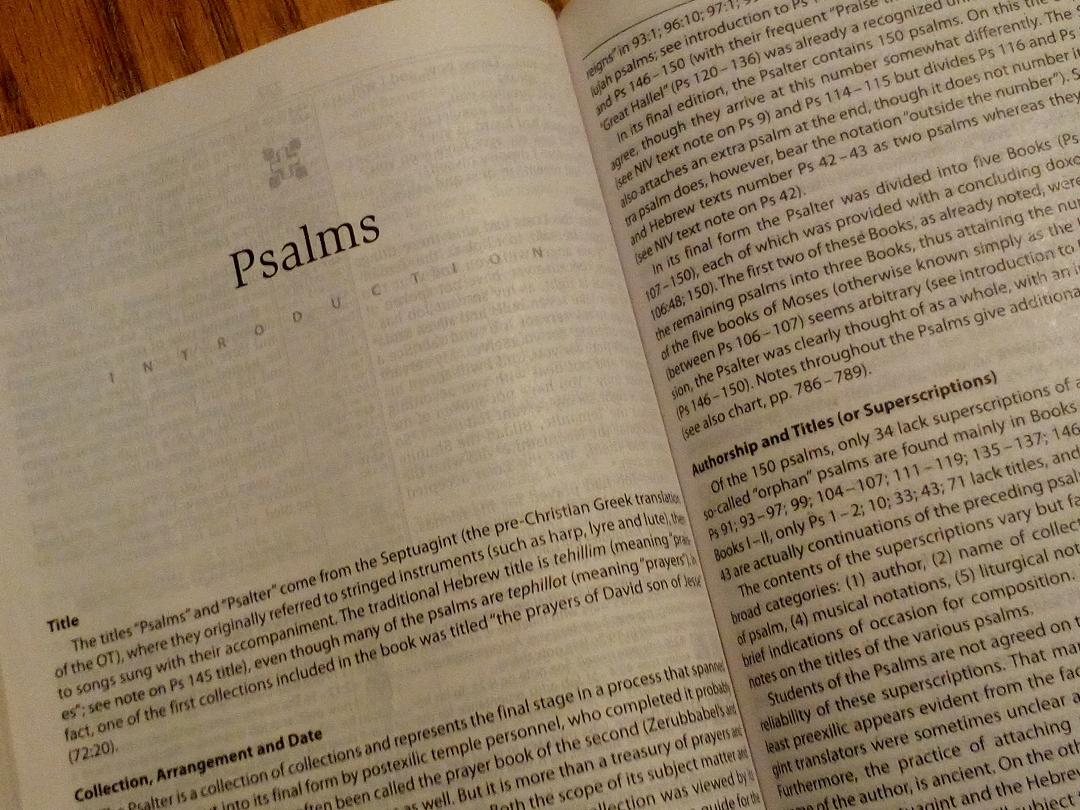
The Bible Project has wonderful videos and articles for students of the Bible and disciples of Yashua (Jesus) to learn from. This post is a summary in my own words from their article on the book of Psalms found at the link above. Be sure to read it as it expounds on this short summary – you won’t want to miss the details!

The Psalms are a collection of ancient Hebrew poems, prayers, and songs that come from different eras in Israel’s history. The Psalms are not a hymnbook, but many of them were used by Israel’s temple choirs. The book of Psalms was intentionally put together after Israel’s exile to Babylon. The book has a unique design and message that is easy to miss unless it is read from beginning to end. It also is helpful in order to see the book’s overall design to start at the end with the 5 poems of praise to the God of Israel.
The whole book has been divided into five books or sections. Each section has a final poem, which concludes with a similar line. Psalms 1-2 are the introduction to the key themes. Psalm 1 celebrates the person who meditates on the Torah (teaching) while it also refers to the 5 books of Moses containing the foundational laws. Psalm 2 reflects on God’s promise to King David and concludes all who take refuge in the messianic king will be blessed. Together, they tell us the Psalms’ purpose, designed to be the prayer book of God’s people who are striving to be faithful to the instructions of the Torah while hoping and waiting for the messianic kingdom. Psalms 3-41 are a call to covenant faithfulness. Psalms 42-72 speak of the hope of the coming messianic kingdom. Psalms 73-89 are poems about the hope for the Messiah after exile. Psalms 90-106 are about the God of Israel as the King of all creation. These are some of my favorite Psalms! From God being our dwelling place, to mountains, trees, and rivers being summoned to celebrate the day when God will bring His future kingdom, justice, and healing over all the earth, this section makes it clear that all creation is indeed in His plans of restoration! Psalms 107-150 are poems of praise and songs of ascent.

There are many types of poems in the book, with two major categories – lament and praise. Poems of lament express the poets’ pain, anger, and confusion regarding the horrible things happening to them and around them. Laments bring our attention to what’s wrong in the world and at the same time, asks God to do something about it. There are a lot of lament poems in the book. This shows us a couple of things:
-
- It is an appropriate response that we lament over all the tragedy and evil in this world
- Lamentation is an important part of prayer
These two points are really good news to me. It also is an answer to prayer! As a Christian who is awake to the injustices done to animals and the earth, lamenting is common in my prayers to God. I had concerns as to whether or not God was really okay with how sorrowful my prayers can be, after all, I want to be found faithful to Him. I want to show Him that I believe in Him and know that He will indeed do something about all this injustice. I now have the answers! Praise Him!
Laments make up much of books One through Three. Woven into laments are praise poems, as well. They often retell stories as to what God is doing or has done in the lives of His people. The poems express joy, bring attention to and celebrate the good in the world. They are full of thanksgiving, thanking God for all He has done, is doing, and will do. By the time we get to Books Four and Five, the praise poems out number the laments, and the Book of Psalms reach a pinnacle in the five-part hallelujah conclusion.

Having learned how this book has been structured it is easy to see the book’s overarching message is timeless. No matter what generation God’s people come from throughout history, the Psalms are a new Torah teaching us about the lifelong practice of prayer as we endeavor to follow the Father’s instructions from the first Torah (and today, we include the prophets, and the new covenant books). We have context in which to place our own pain and anger over incredible injustices happening in the times in which we live, while at the same time, we are given hope and comfort on our journey until the day our Messiah returns!
As we read the book of Psalms, The Bible Project article explains that the “shift from lament to praise is profound, and it tells us something about the nature of prayer… Hoping for the messianic kingdom creates tension as we see the tragic state of our world. The Psalms teach us to neither ignore our pain nor let it determine the meaning of our lives. Biblical faith and prayer is always forward-looking, anticipating the day when God will fulfill his promises and praising him for this ahead of time. The Torah and messiah, lament and praise, faith and hope, this is what the book of Psalms is all about.”
Thank you for reading! Below is a short video that will take this summary and bring it to life with the unique animation technique that The Bible Project does so well! If you found this post helpful, please share! ~Kathy

